Growing up in an Asian family, I’ve seen my fair share of Eastern home remedies.
There was the hard-boiled egg that my mom would rub on my bruises to make them go away.
There was cạo gió, a method of scraping the skin with menthol oil and a coin to relieve aches and pains.
And then there were Vietnamese preserved lemons (also known as chanh muối), a drink that can be taken hot or cold for a variety of ailments from nausea to the common cold.
Chanh muối
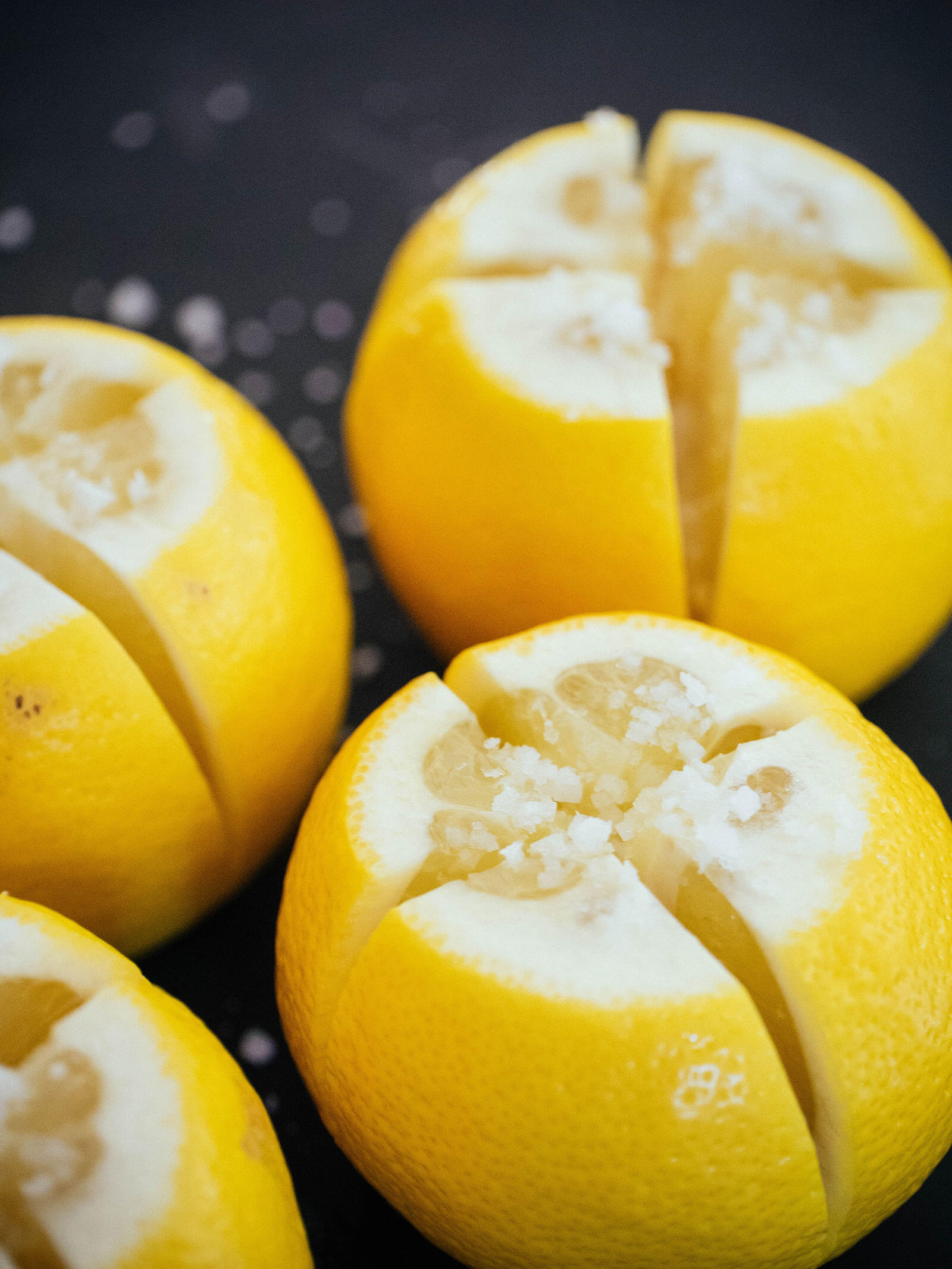
And even though the term “home remedy” probably conjures up an unpleasant brew that you ingest because you have to, chanh muối actually makes a very refreshing summertime (or anytime) drink — especially if you’re more of a salt aficionado than a sweets person, like I am.
Because this recipe requires fermenting the lemons with their peels on, I recommend using the best organic lemons you can find. Choose small- to medium-sized lemons with blemish-free skins.
I like the tartness of Eureka lemons, but sweeter Meyer lemons also work; they’ll just give the chanh muối a slightly different, non-traditional flavor.
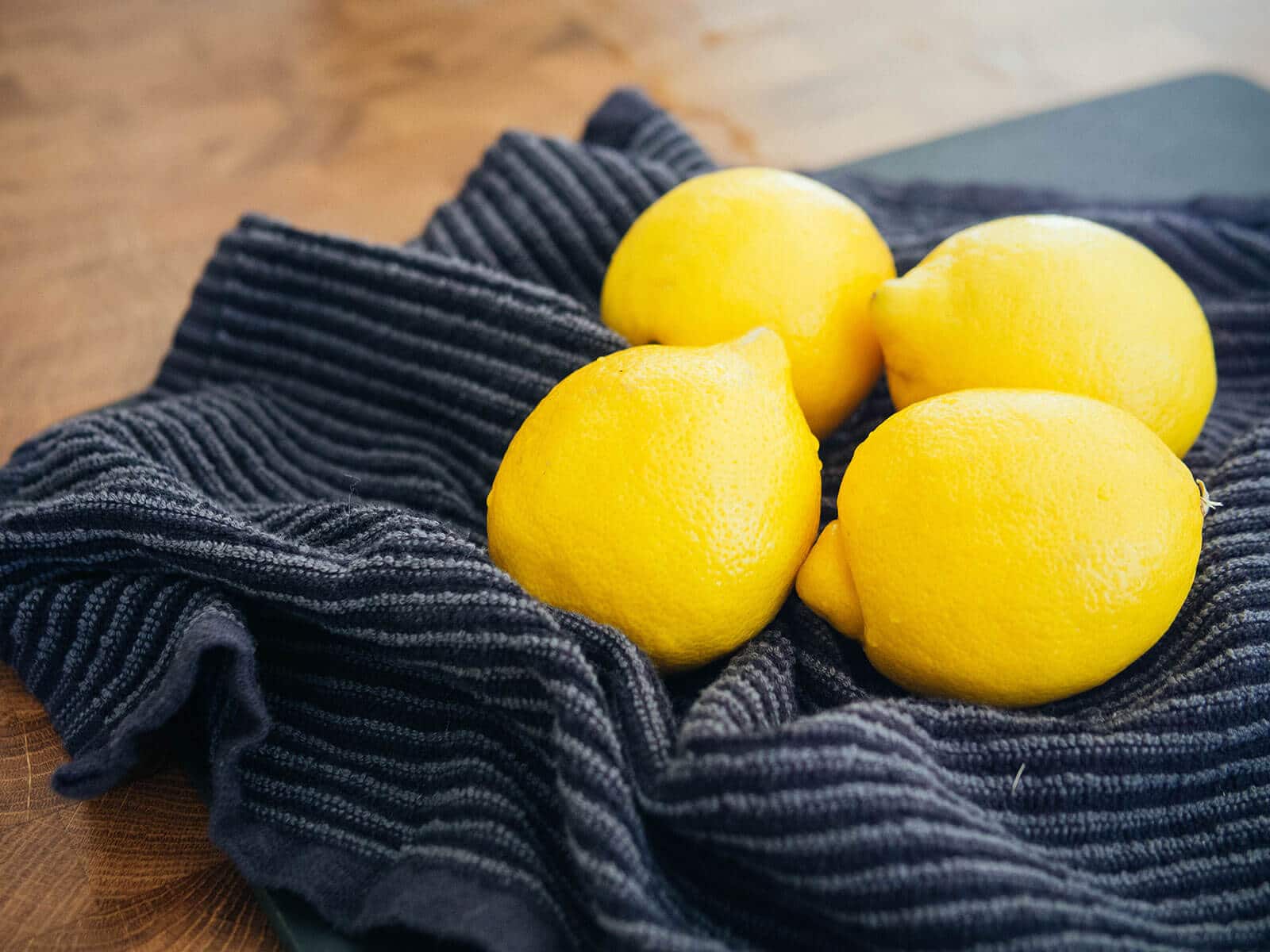
Chanh Muối (Vietnamese Preserved Lemons)
Makes 1 quart
Ingredients
1/4 cup kosher salt, plus more to sprinkle
1 1/2 cups water
3 to 5 organic lemons (more or less, depending on how many will fit in your jar)
Instructions
In a small saucepan over medium-high heat, dissolve the salt in water and then remove the brine from heat.
Wash and scrub your lemons thoroughly to remove any wax from store-bought lemons, or any dirt from homegrown lemons.
Slice off the top and bottom of the lemon so that a little flesh is showing.
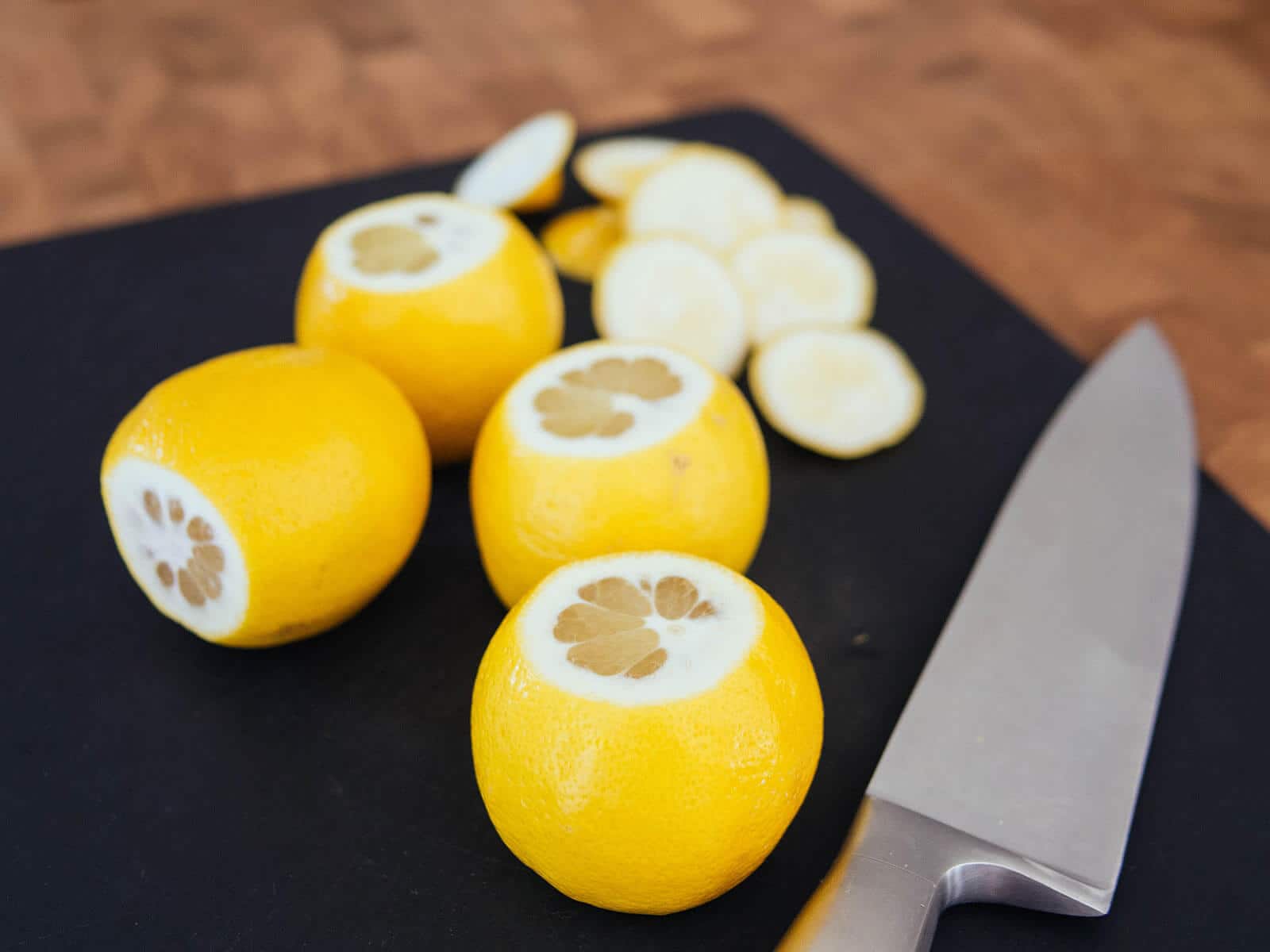
Slice the lemon lengthwise into quarters, but do not slice all the way through.
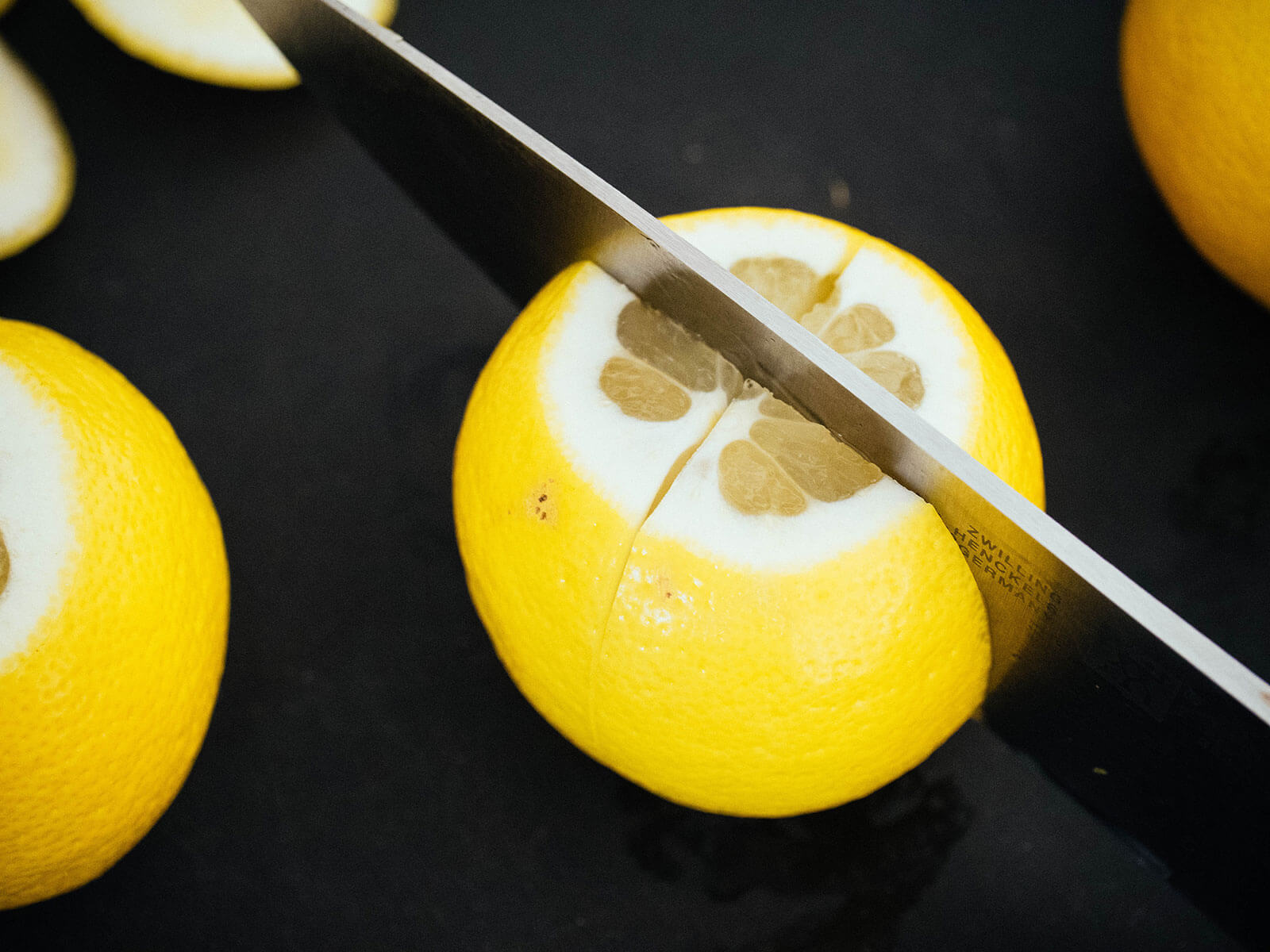
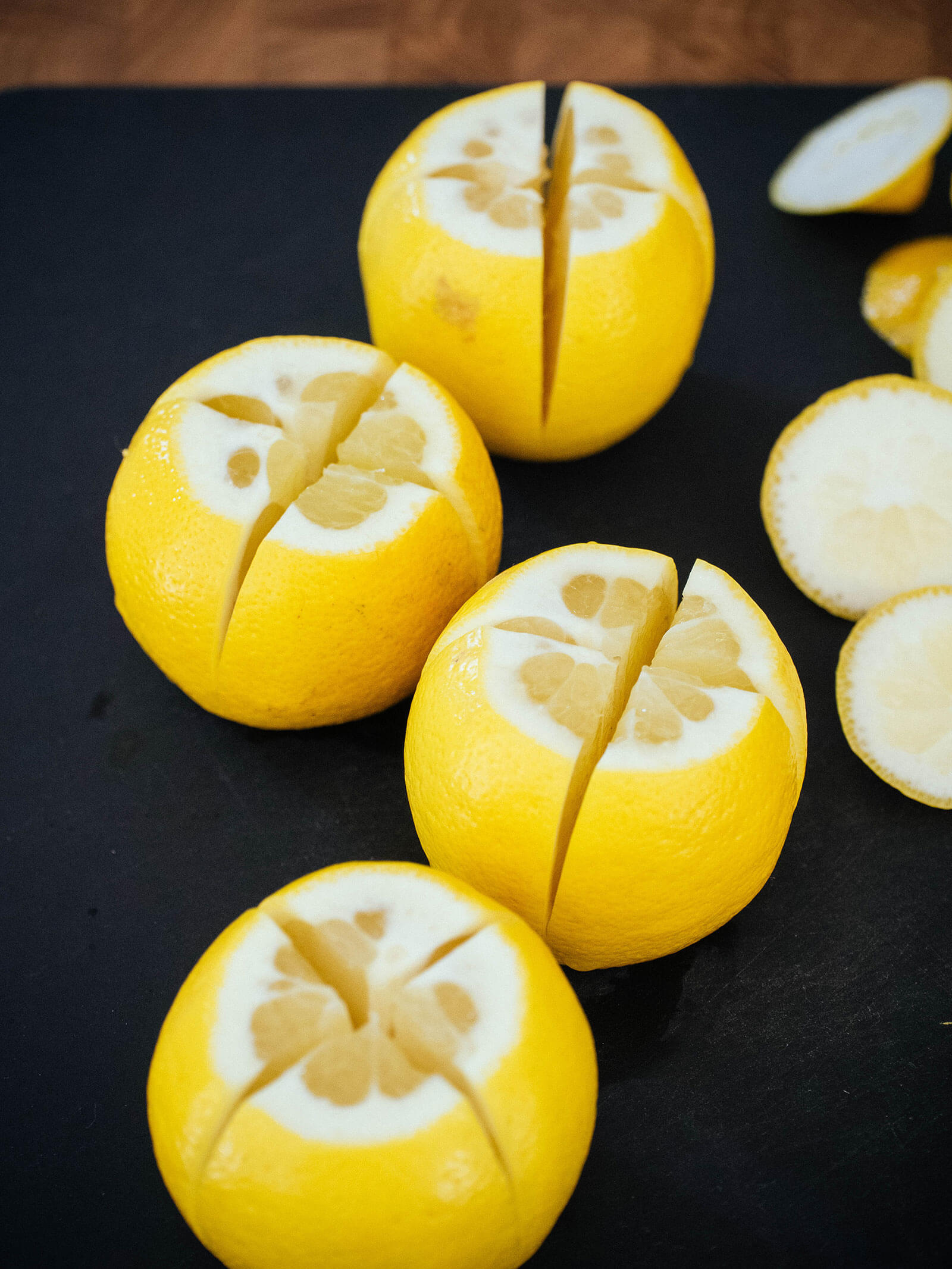
Liberally salt the inside of your almost-quartered wedges and set aside while you slice and salt the other lemons.
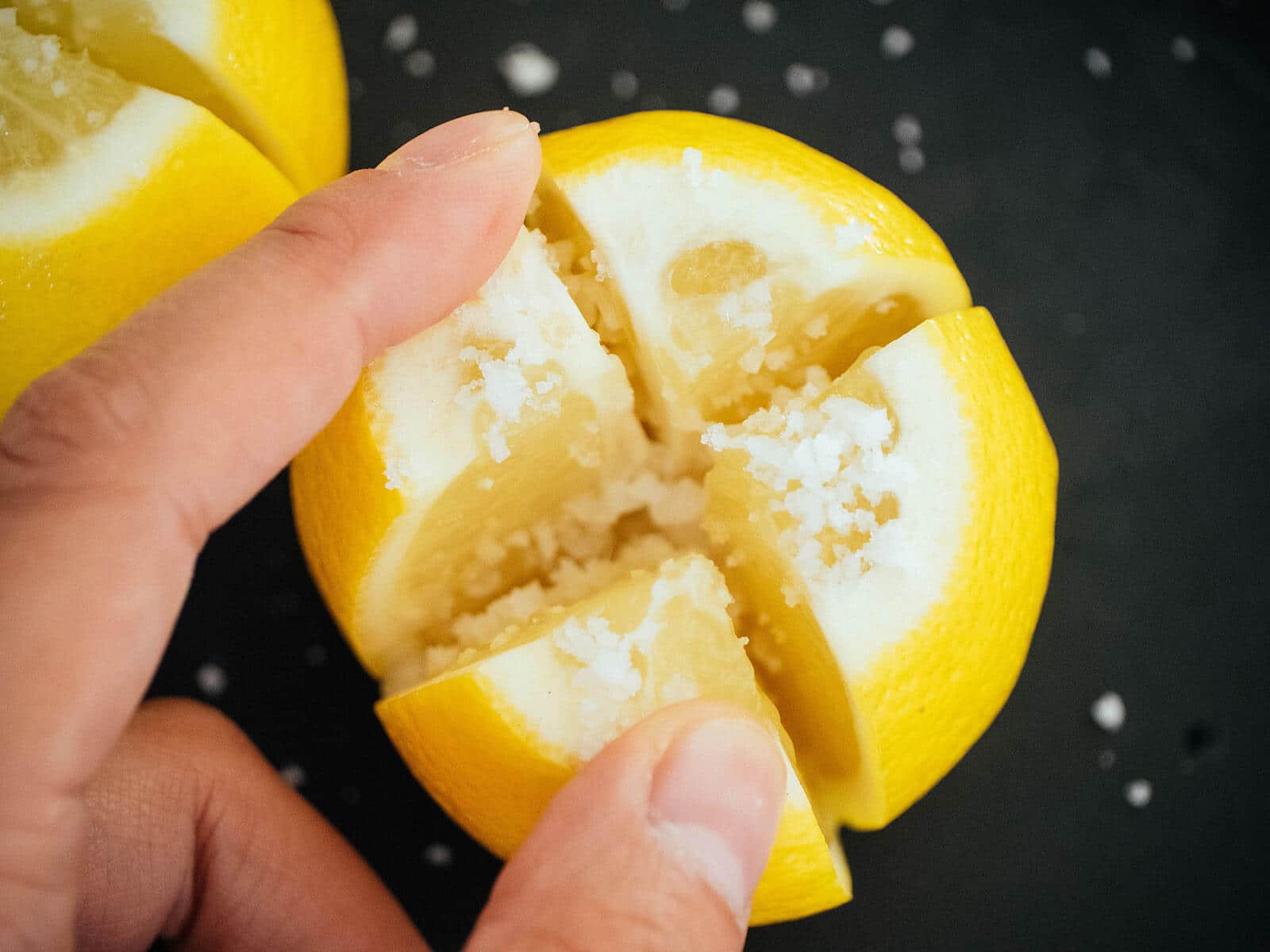
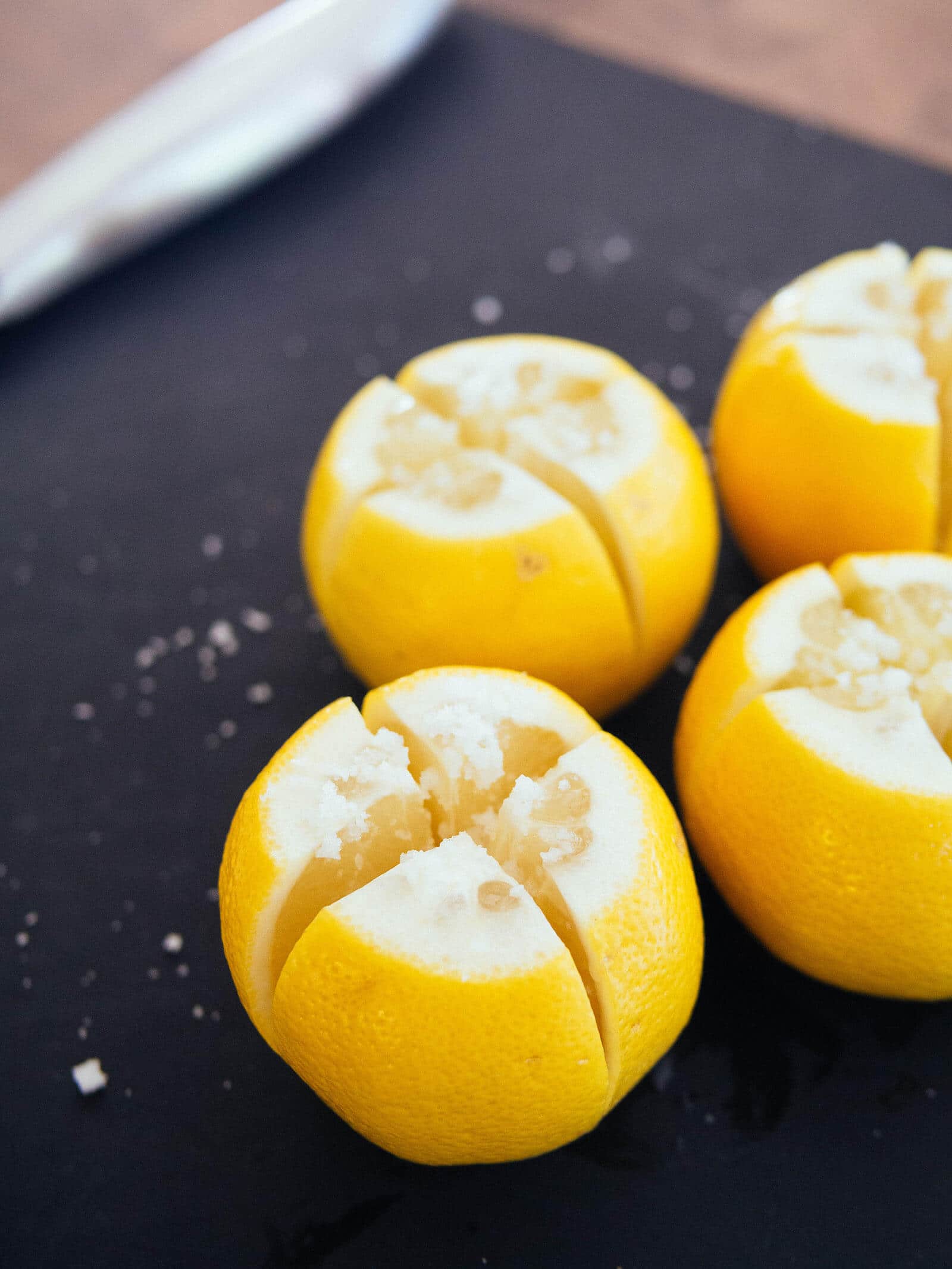
Pack the lemons into your jar and cover them completely with brine.
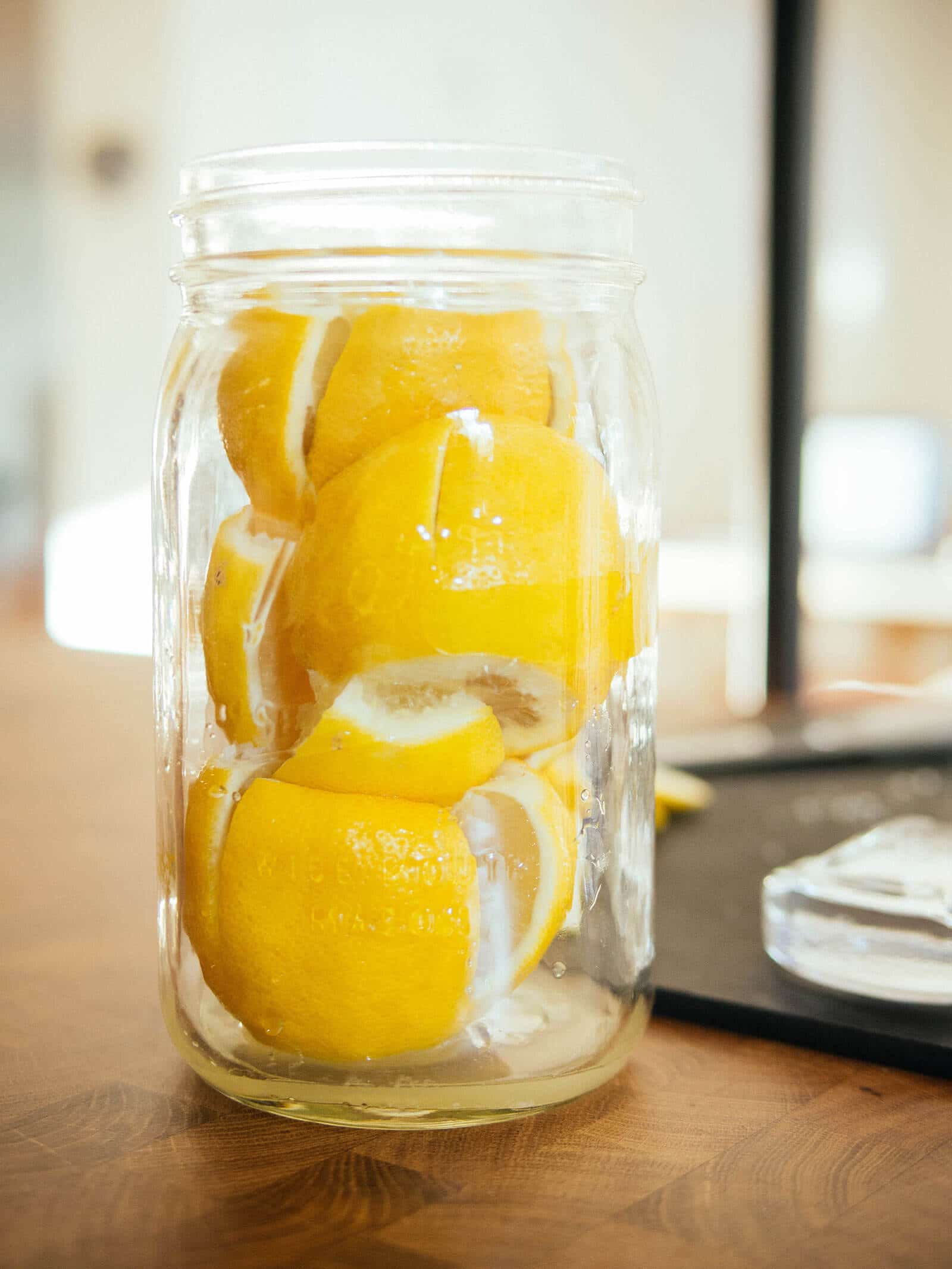
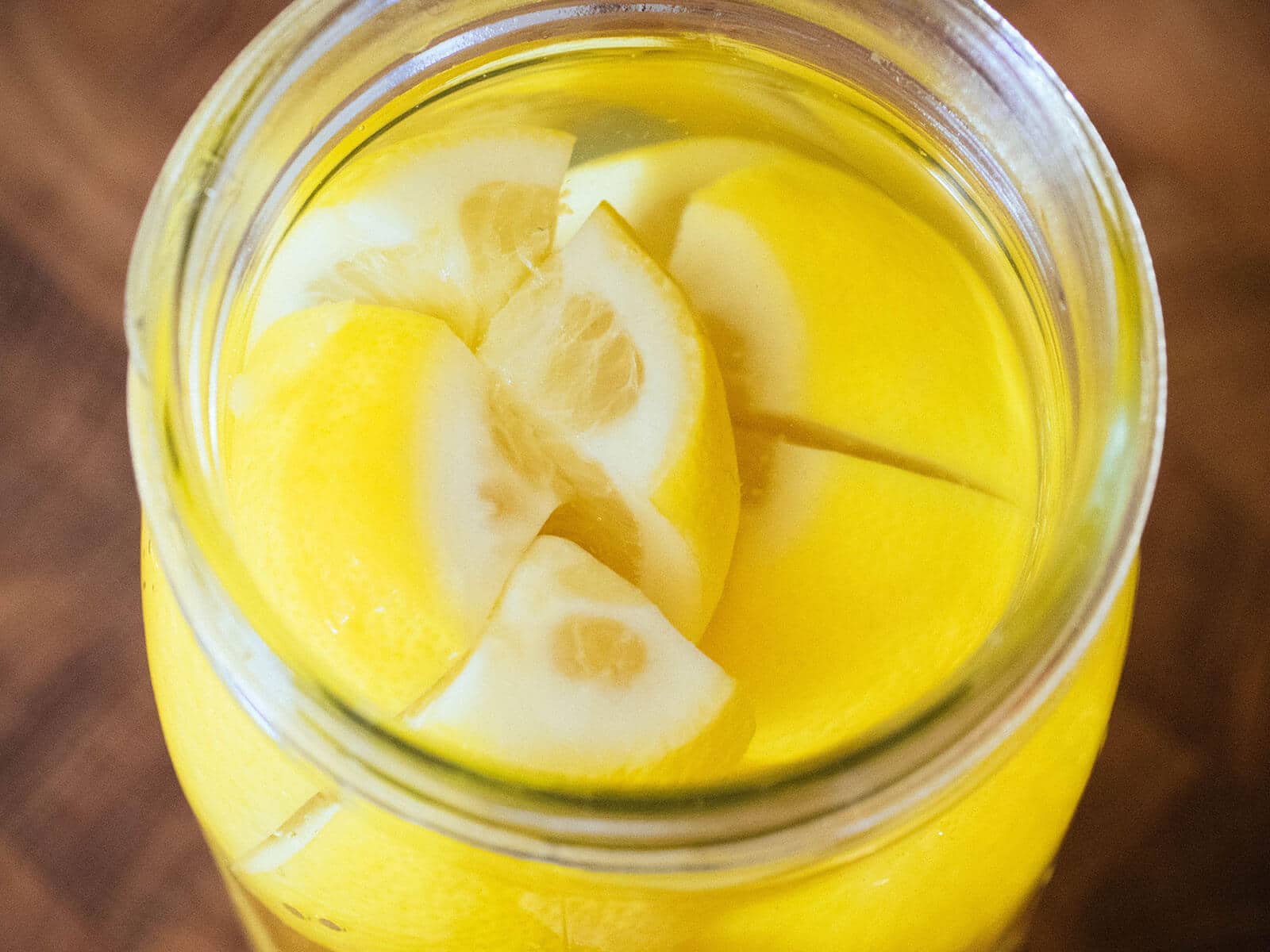
Disclosure: If you shop from my article or make a purchase through one of my links, I may receive commissions on some of the products I recommend.
If you’re using a widemouth jar, or if your lemons won’t stay submerged, sink a glass weight in the jar (the kind used for mason jar fermenting — here’s what I use) to hold the lemons down.
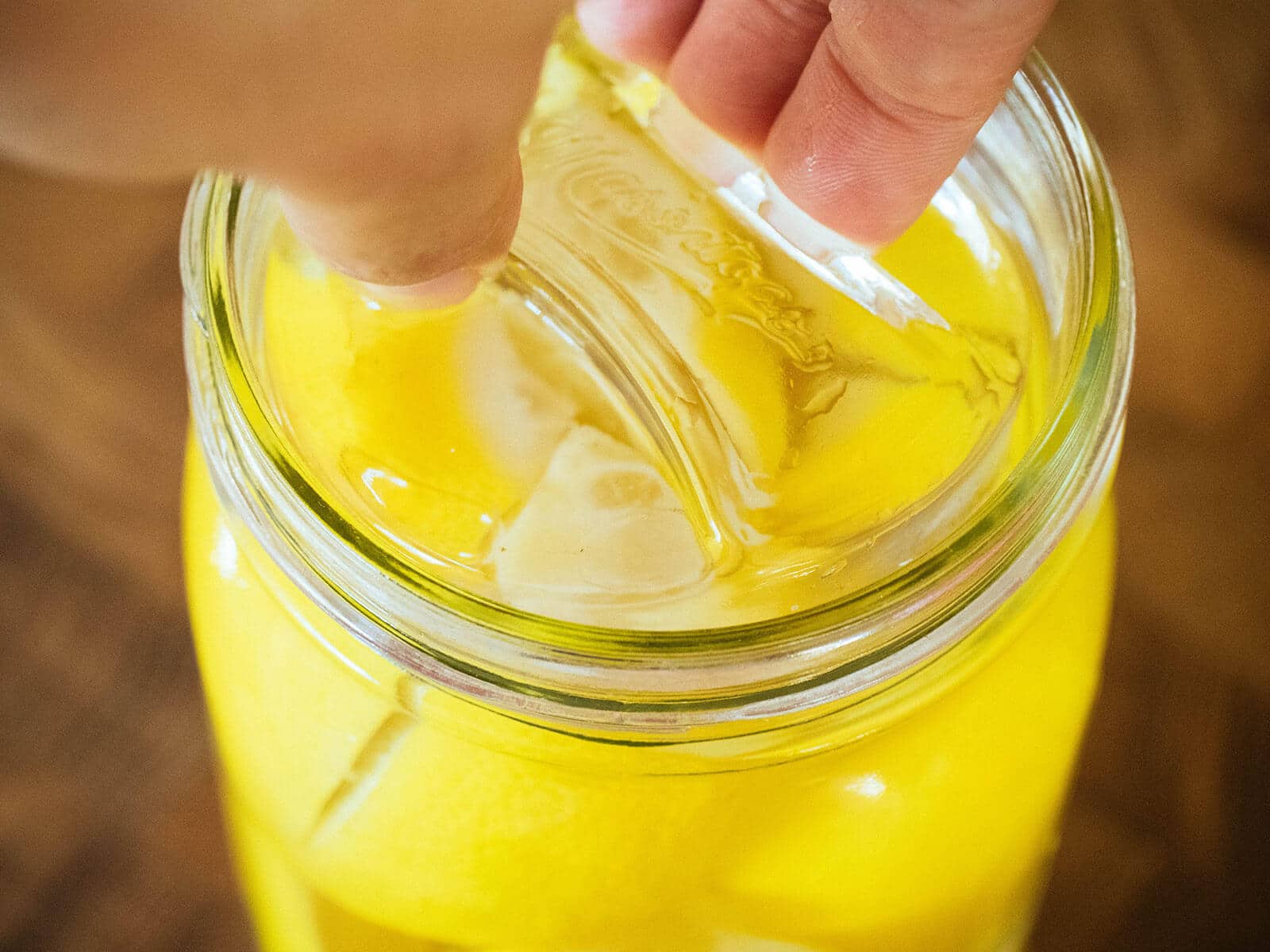
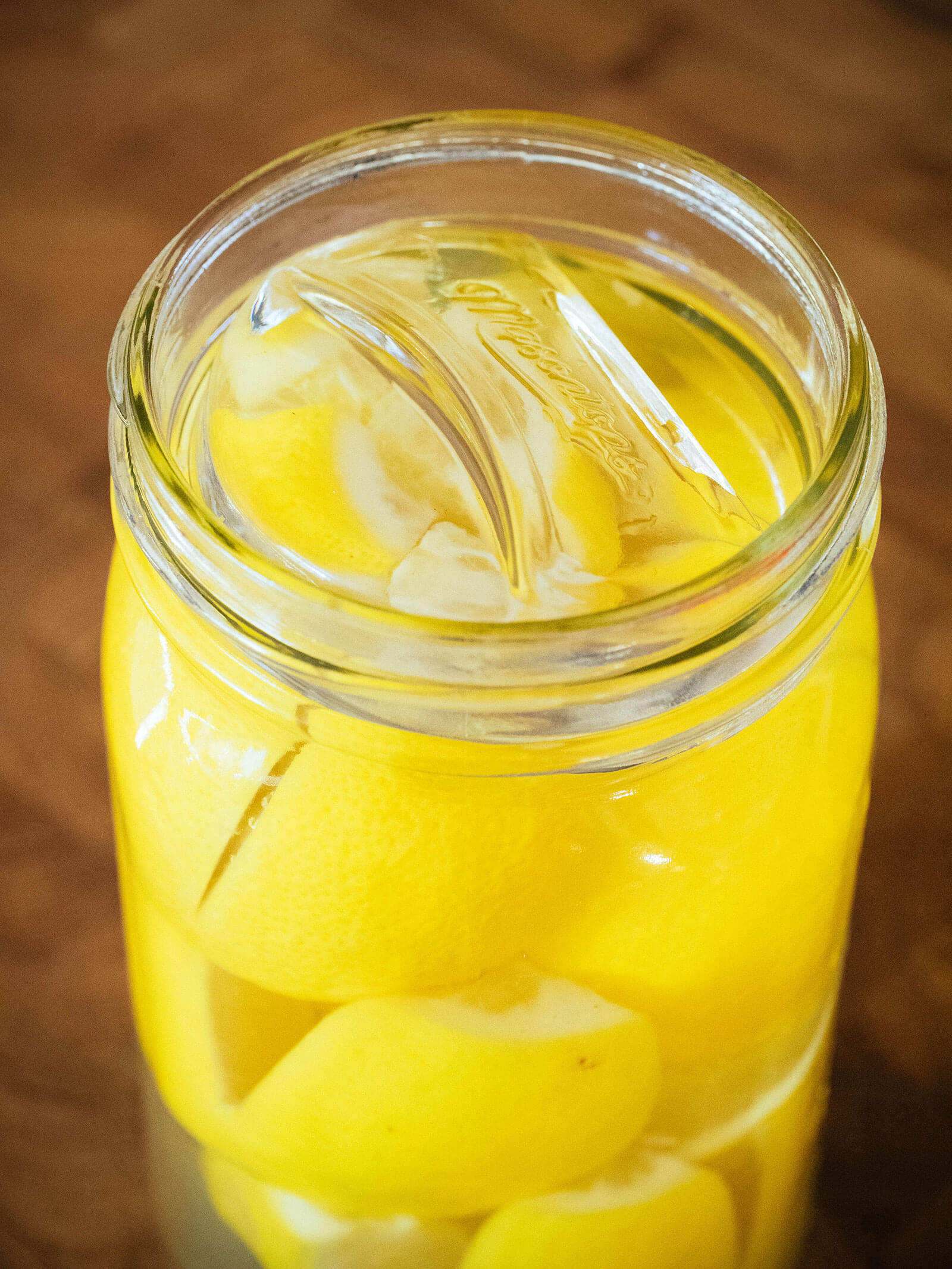
Wipe any salt residue off the rim and seal the jar loosely with a lid, as you want to let the gases escape as your lemons ferment.
Leave the jar out at room temperature for at least three weeks. The lemons may turn darker and the brine may become cloudier during this time — that’s when you know they’re good and ready!
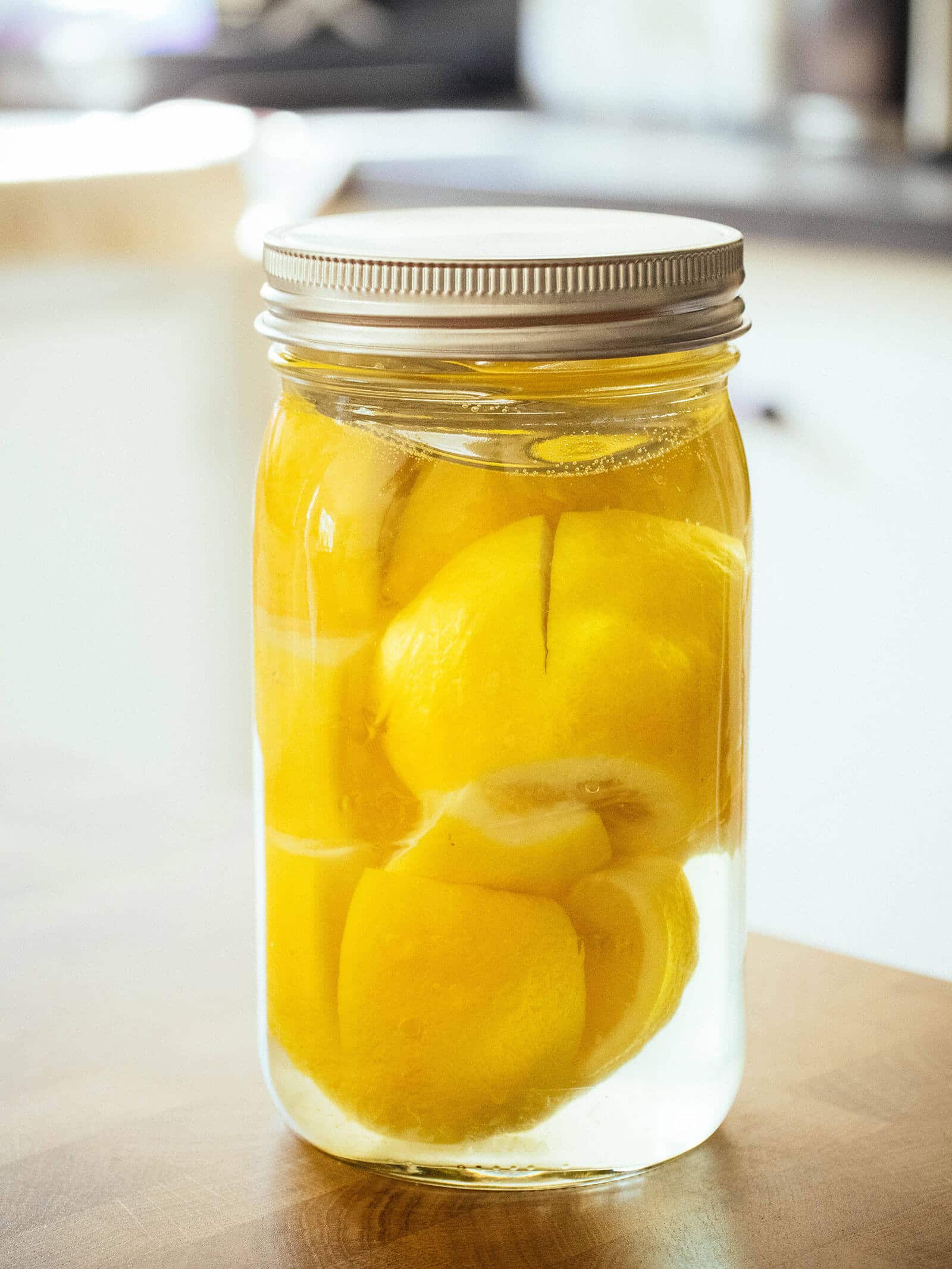
Always use a clean utensil to scoop the lemons out. Other than that, the jar will keep at room temperature indefinitely and does not need to be refrigerated.
Now for the drink…
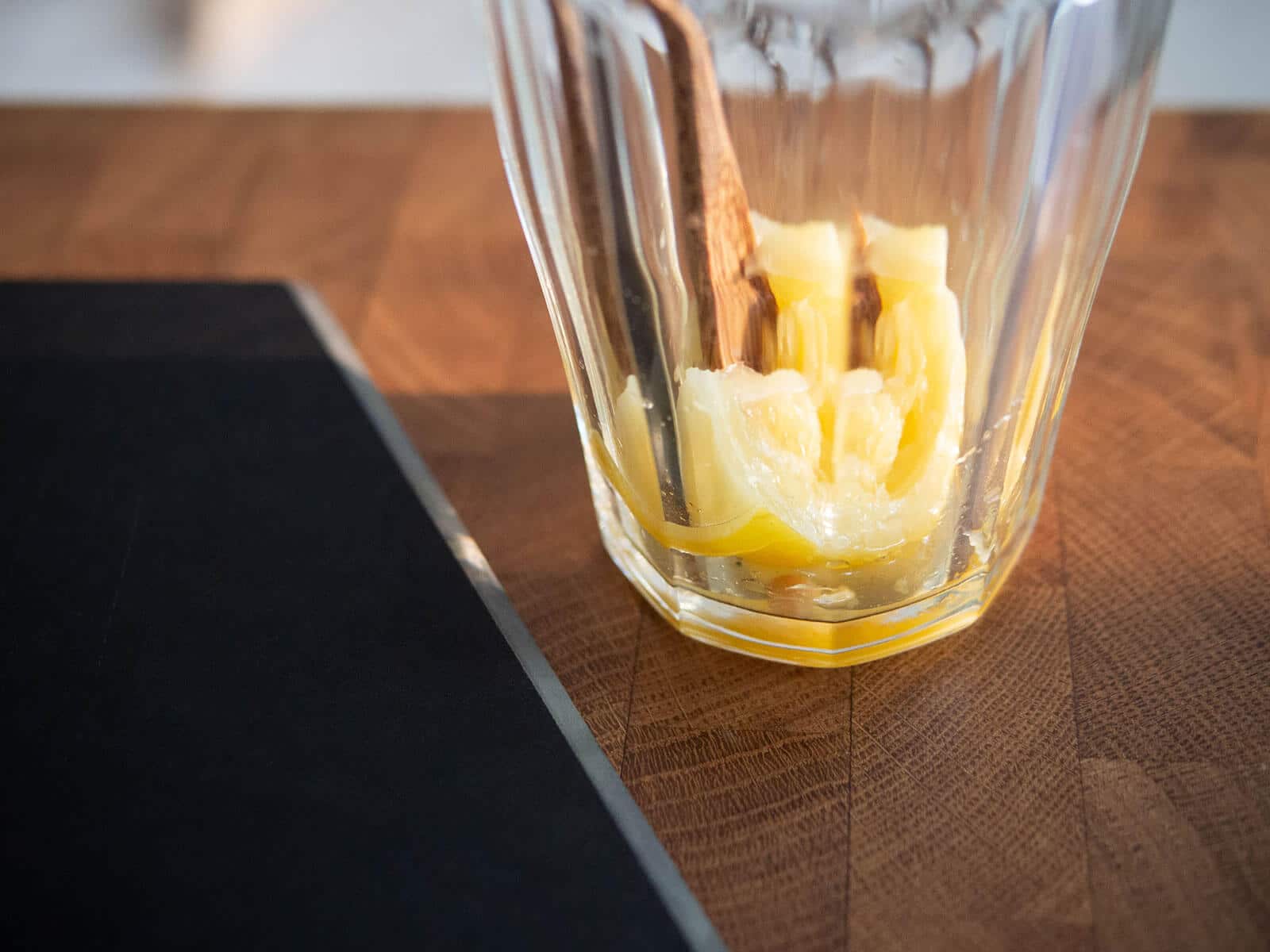
Chanh Muối (Vietnamese Salty Lemonade)
Makes 1 glass
Ingredients
1 chanh muối wedge
Soda water, still water, or Sprite
Sugar, to taste
Ice (optional)
Instructions
My favorite way to drink this is mixed with soda water (pumped from my SodaStream), but you can also use still water for a more traditional lemonade or Sprite for a refreshingly fizzy drink.
Separate and spoon a chanh muối wedge into a tall glass.
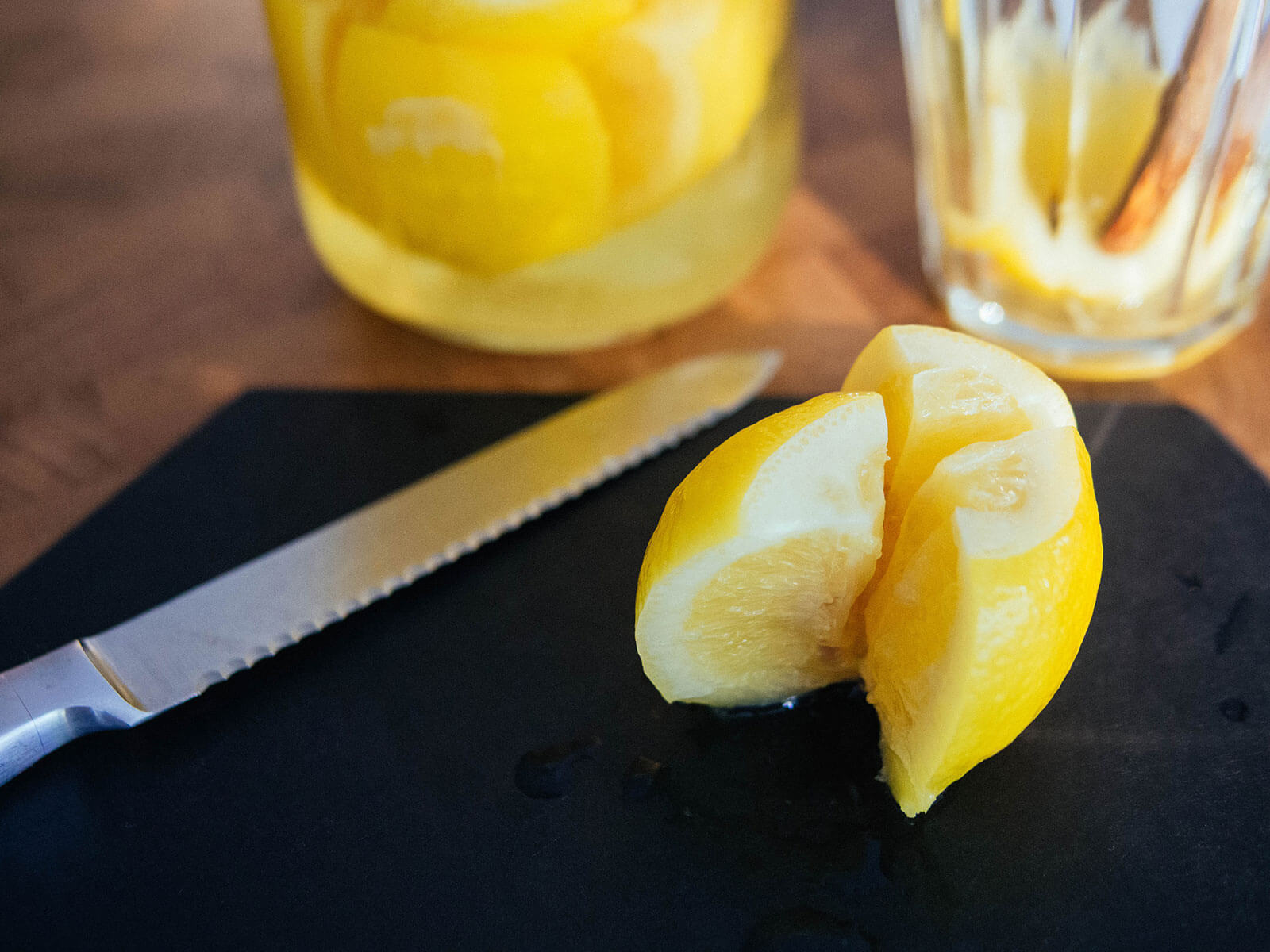
Muddle the lemon in your glass with a spoon to mash most of the juices out.
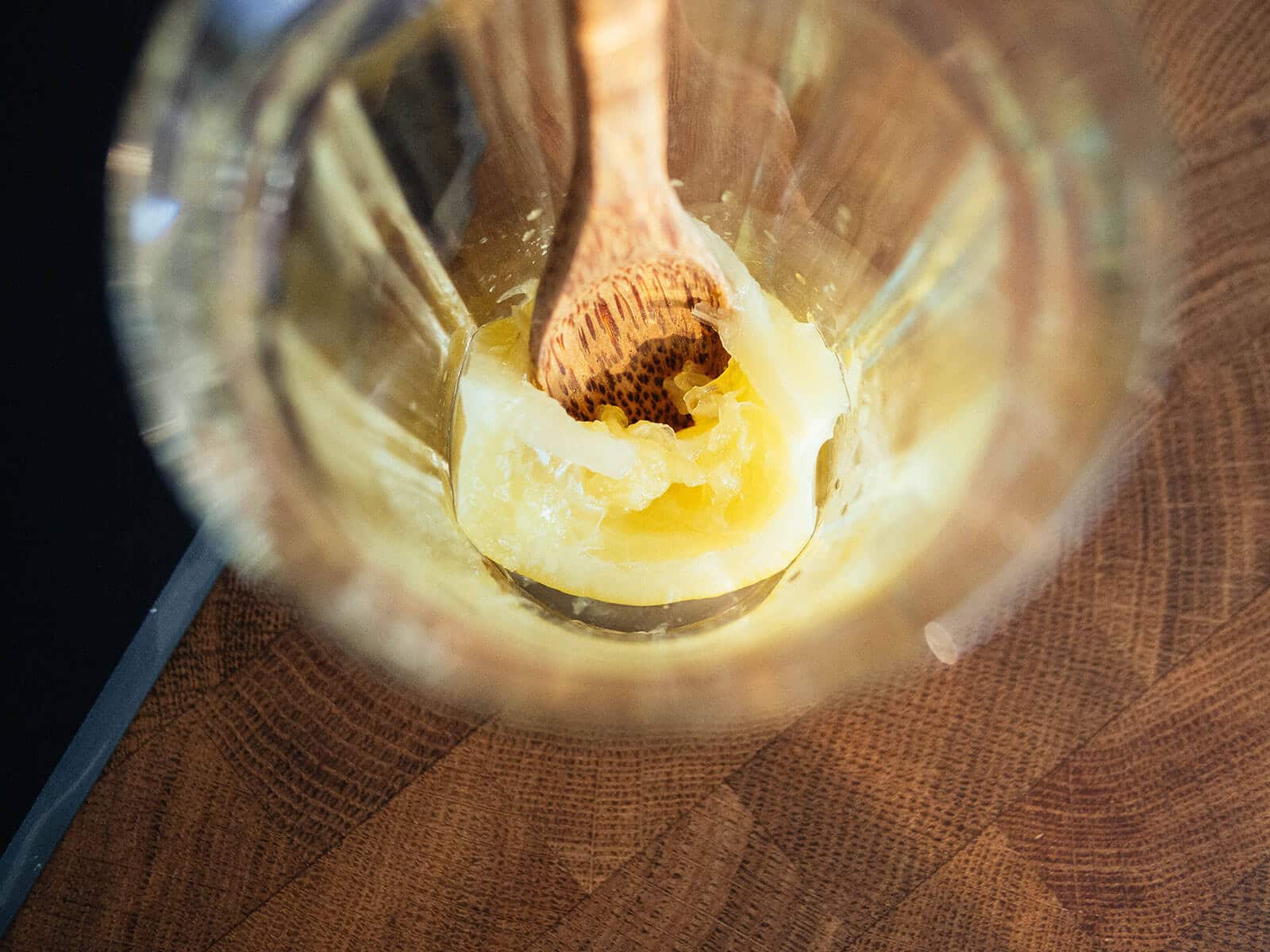
Add your choice of soda water, still water, or Sprite. If using soda or still water, stir in a few spoonfuls of sugar to taste. It should have a salty-sweet flavor that’s not too overpowering.
Add ice if desired, and serve!
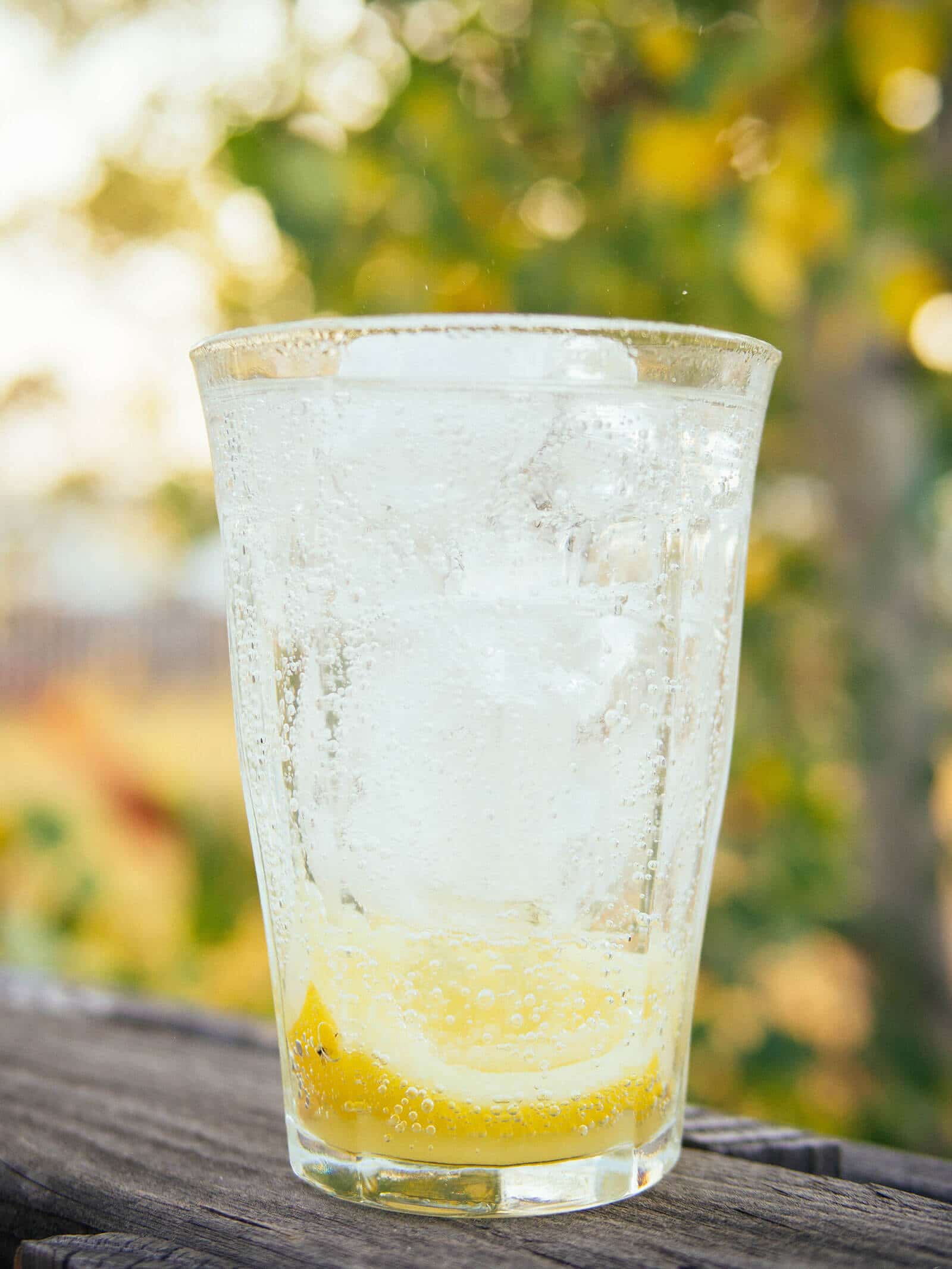
For another variation that can help soothe your cold symptoms, simply steep a chanh muối wedge in a cup of hot water and stir in some honey. I swear this little home remedy works!
And if you liked this, you might also enjoy my Moroccan Preserved Lemons recipe!
Chanh Muoi (Vietnamese Preserved Lemons and Salty Lemonade)
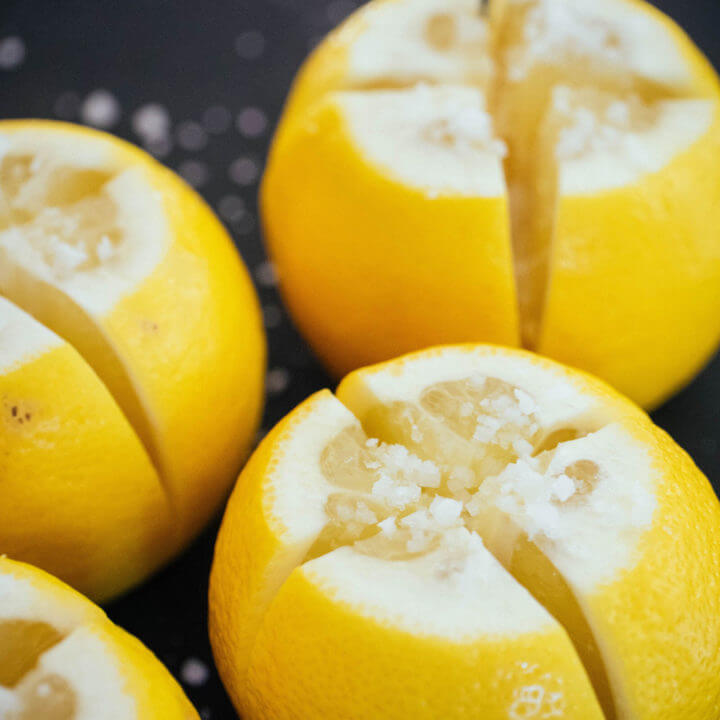
Chanh muoi (Vietnamese preserved lemons) is the secret home remedy used by families to soothe everything from nausea to common colds. Now you can make it yourself!
Ingredients
For the Preserved Lemons
- 1/4 cup kosher salt, plus more to sprinkle
- 1 1/2 cups water
- 3 to 5 organic lemons (more or less, depending on how many will fit in your jar)
For the Salty Lemonade
- 1 chanh muối wedge
- Soda water, still water, or Sprite
- Sugar, to taste
- Ice (optional)
Instructions
To make the preserved lemons:
- In a small saucepan over medium-high heat, dissolve the salt in water and then remove the brine from heat.
- Wash and scrub your lemons thoroughly to remove any wax from store-bought lemons, or any dirt from homegrown lemons.
- Slice off the top and bottom of the lemon so that a little flesh is showing.
- Slice the lemon lengthwise into quarters, but do not slice all the way through.
- Liberally salt the inside of your almost-quartered wedges and set aside while you slice and salt the other lemons.
- Pack the lemons into your jar and cover them completely with brine.
- If you're using a widemouth jar, or if your lemons won't stay submerged, sink a glass weight in the jar (the kind used for mason jar fermenting — here's what I use) to hold the lemons down.
- Wipe any salt residue off the rim and seal the jar loosely with a lid, as you want to let the gases escape as your lemons ferment.
- Leave the jar out at room temperature for at least three weeks. The lemons may turn darker and the brine may become cloudier during this time — that's when you know they're good and ready!
To make the salty lemonade:
- My favorite way to drink this is mixed with soda water (pumped from my SodaStream), but you can also use still water for a more traditional lemonade or Sprite for a refreshingly fizzy drink.
- Separate and spoon a chanh muối wedge into a tall glass.
- Muddle the lemon in your glass with a spoon to mash most of the juices out.
- Add your choice of soda water, still water, or Sprite. If using soda or still water, stir in a few spoonfuls of sugar to taste. It should have a salty-sweet flavor that's not too overpowering.
- Add ice if desired, and serve!
- For another variation that can help soothe your cold symptoms, simply steep a chanh muối wedge in a cup of hot water and stir in some honey. I swear this little home remedy works!
Notes
Always use a clean utensil to scoop the lemons out. Other than that, the jar of preserved lemons will keep at room temperature indefinitely and does not need to be refrigerated.
Nutrition Information:
Yield:
16Serving Size:
1 glassAmount Per Serving: Calories: 17Total Fat: 0gSaturated Fat: 0gTrans Fat: 0gUnsaturated Fat: 0gCholesterol: 0mgSodium: 1776mgCarbohydrates: 5gFiber: 1gSugar: 3gProtein: 0g
Nutrition information isn’t always accurate.
This post updated from an article that originally appeared on February 22, 2012.


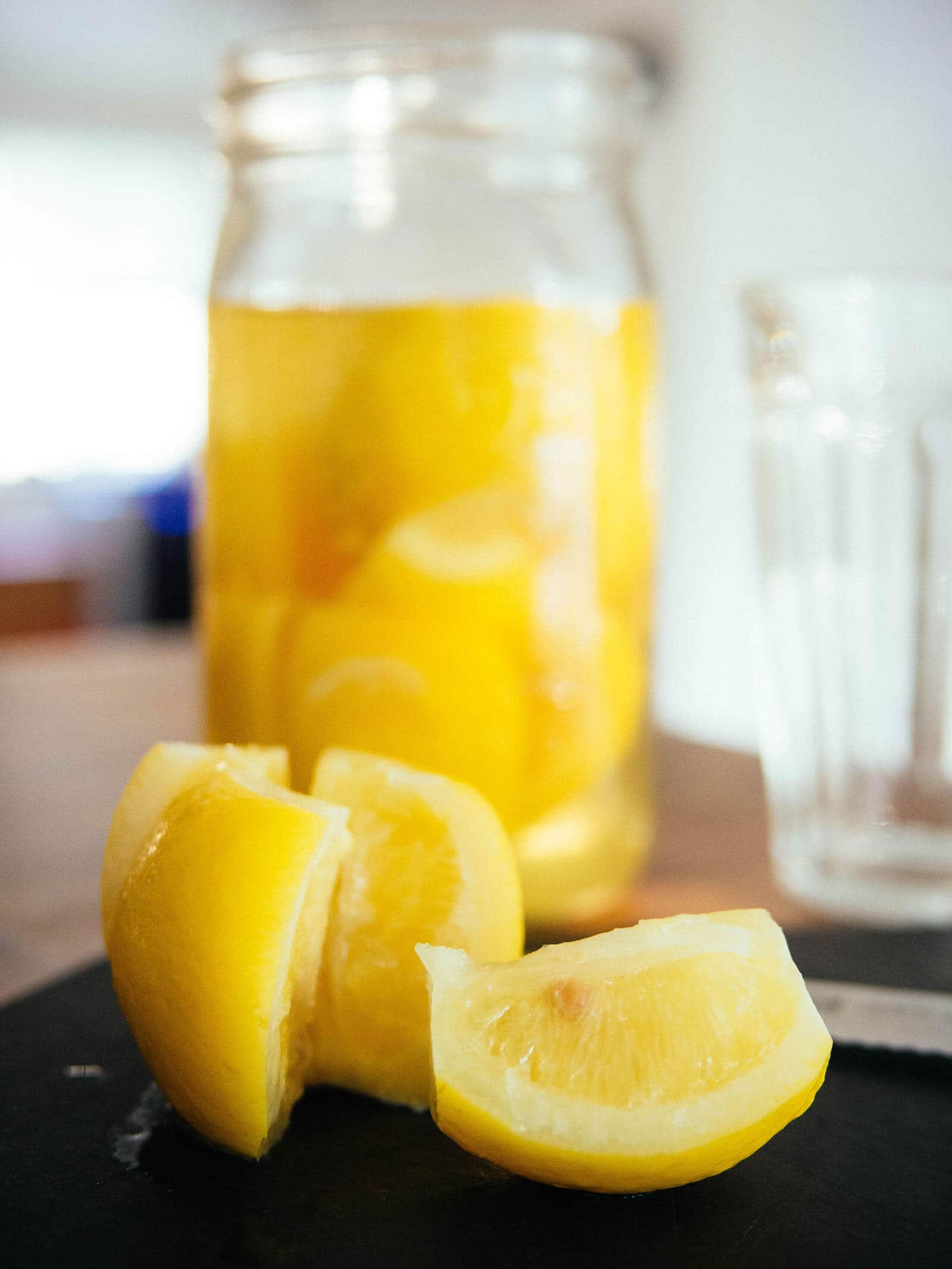
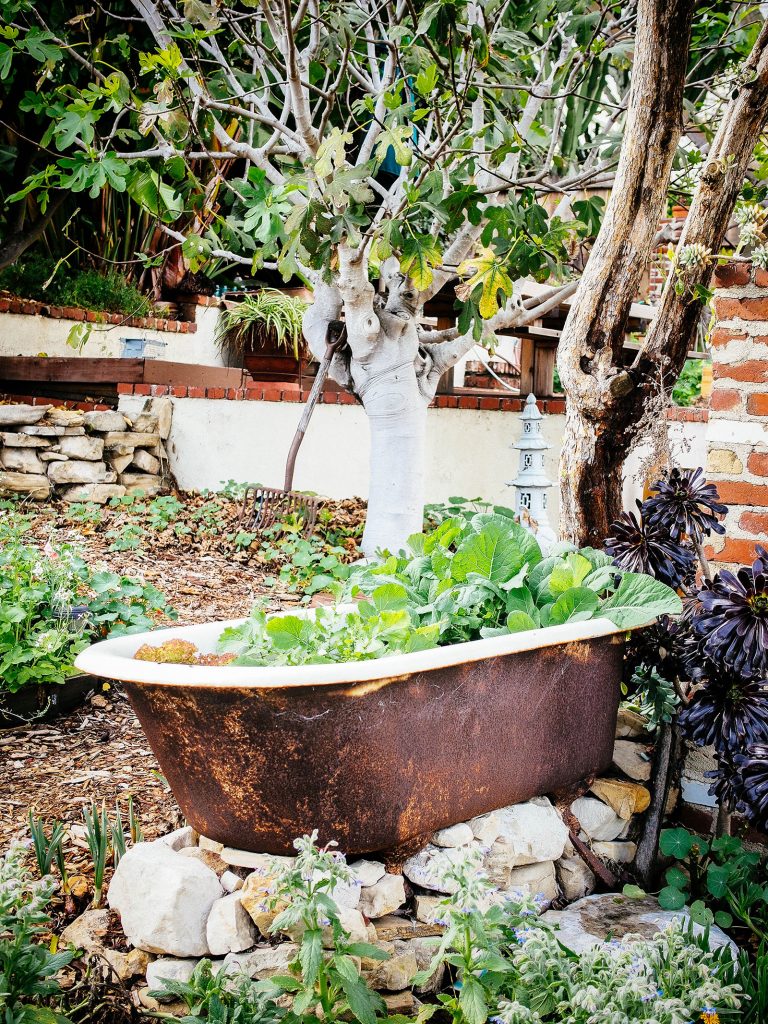
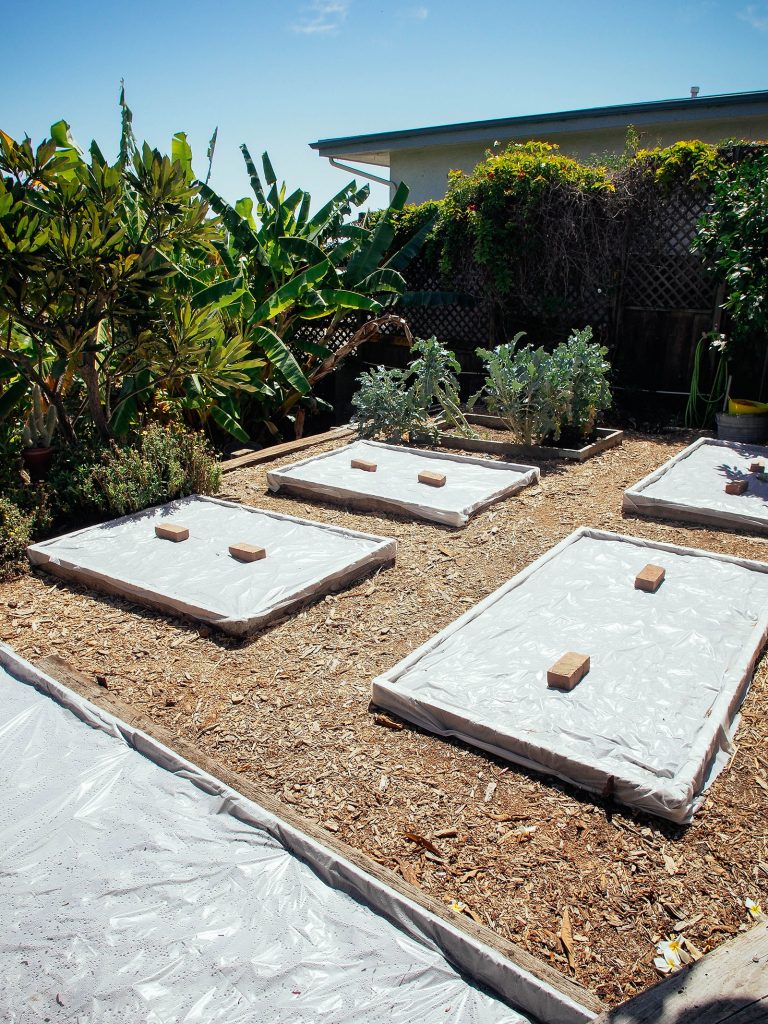
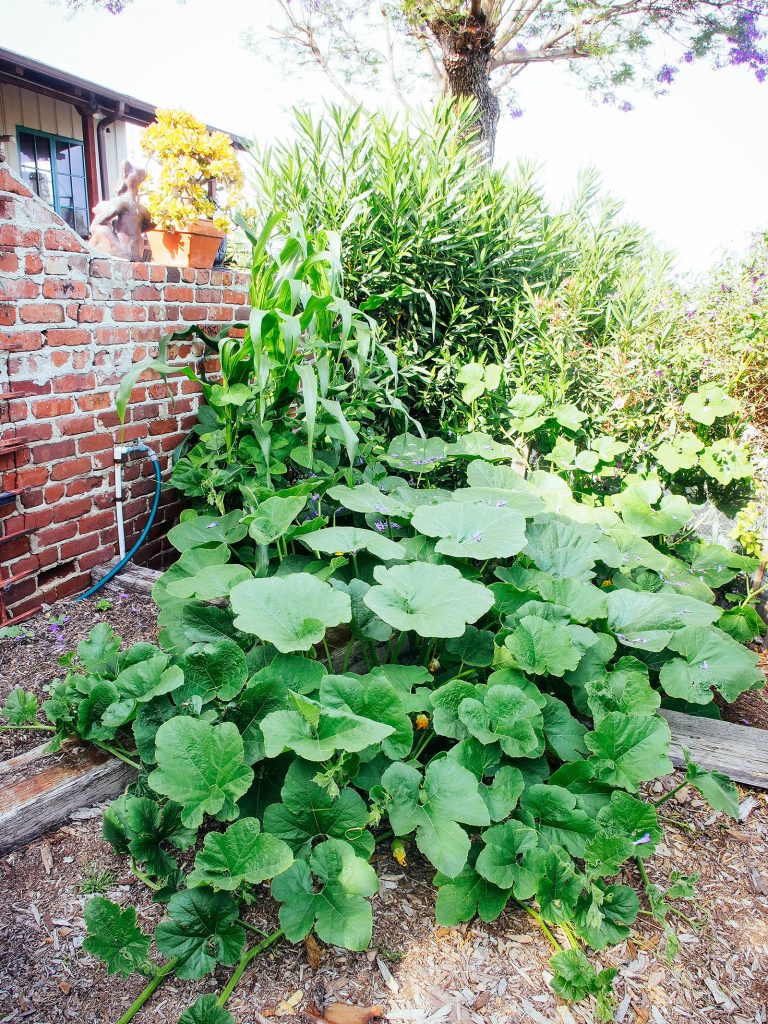
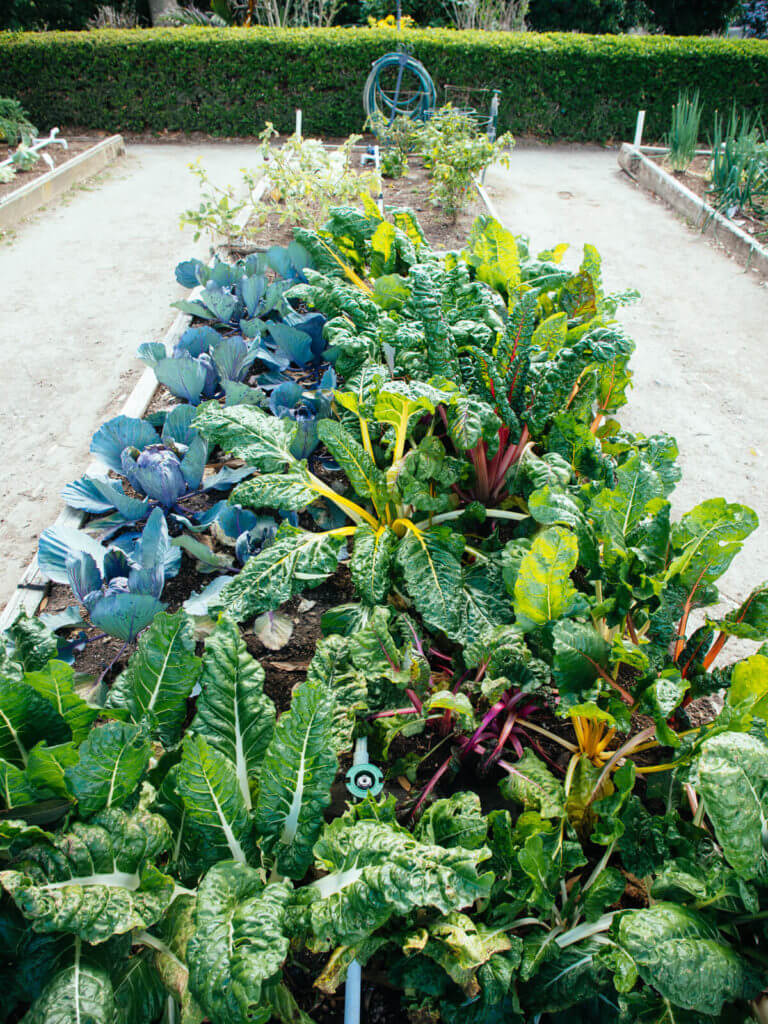


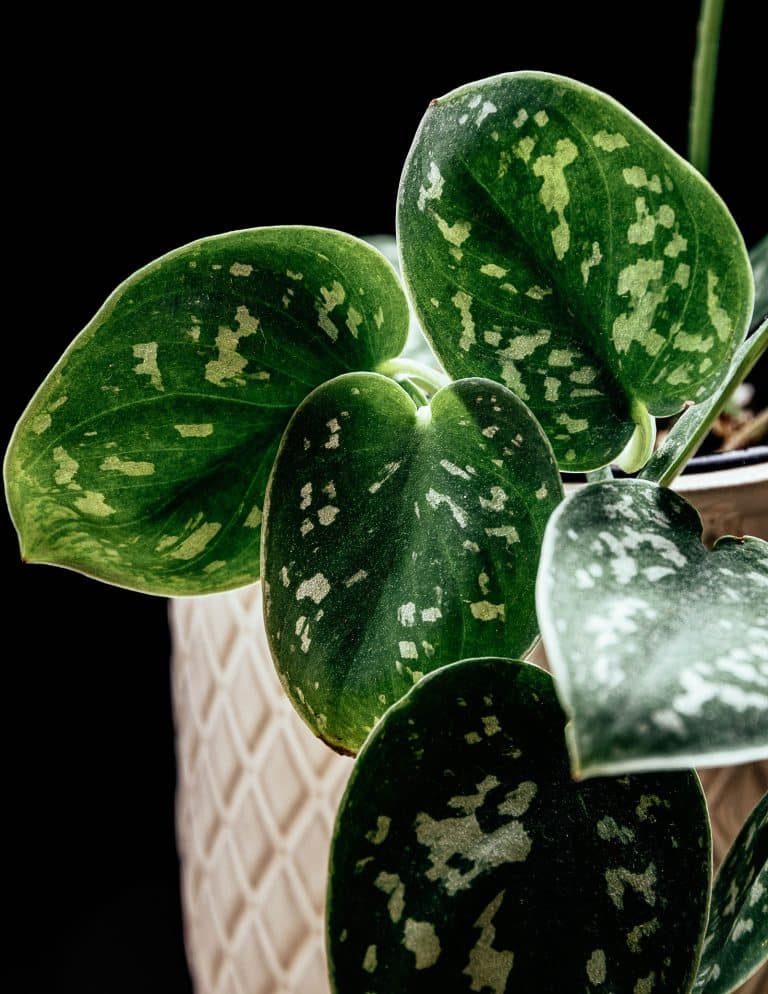
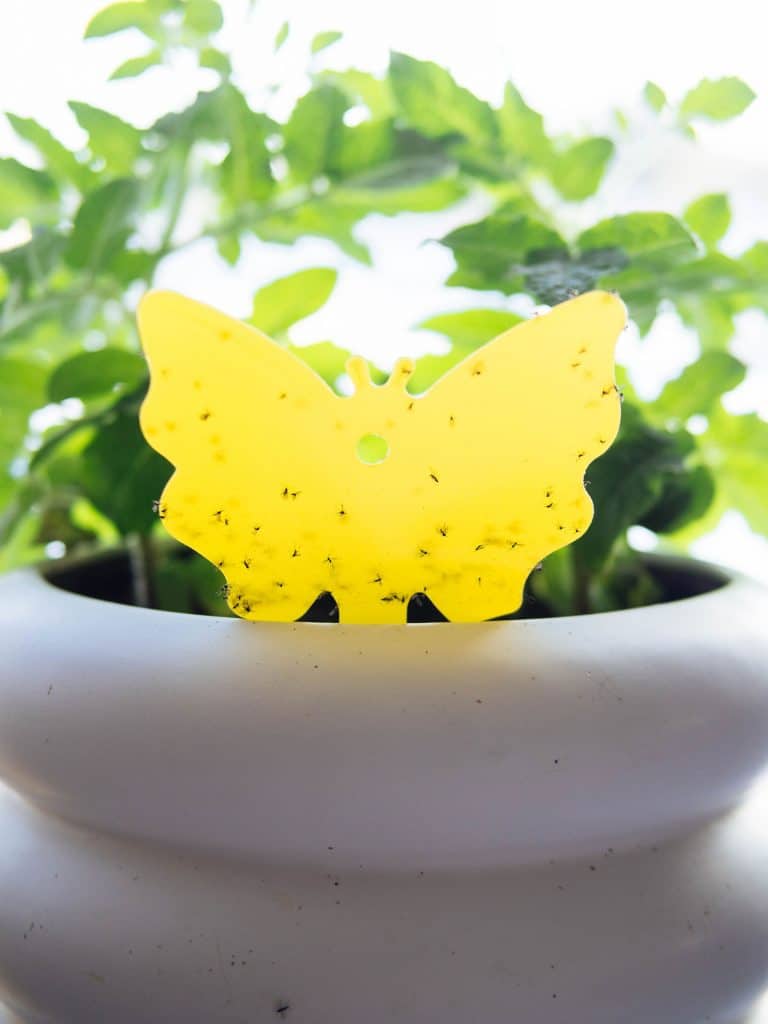
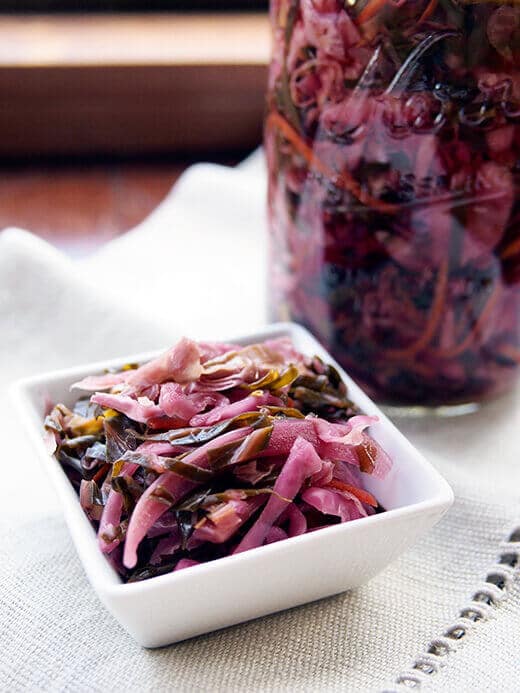
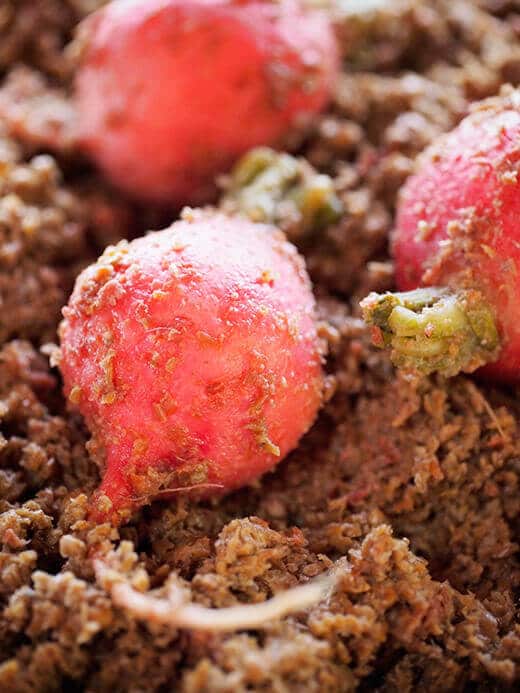
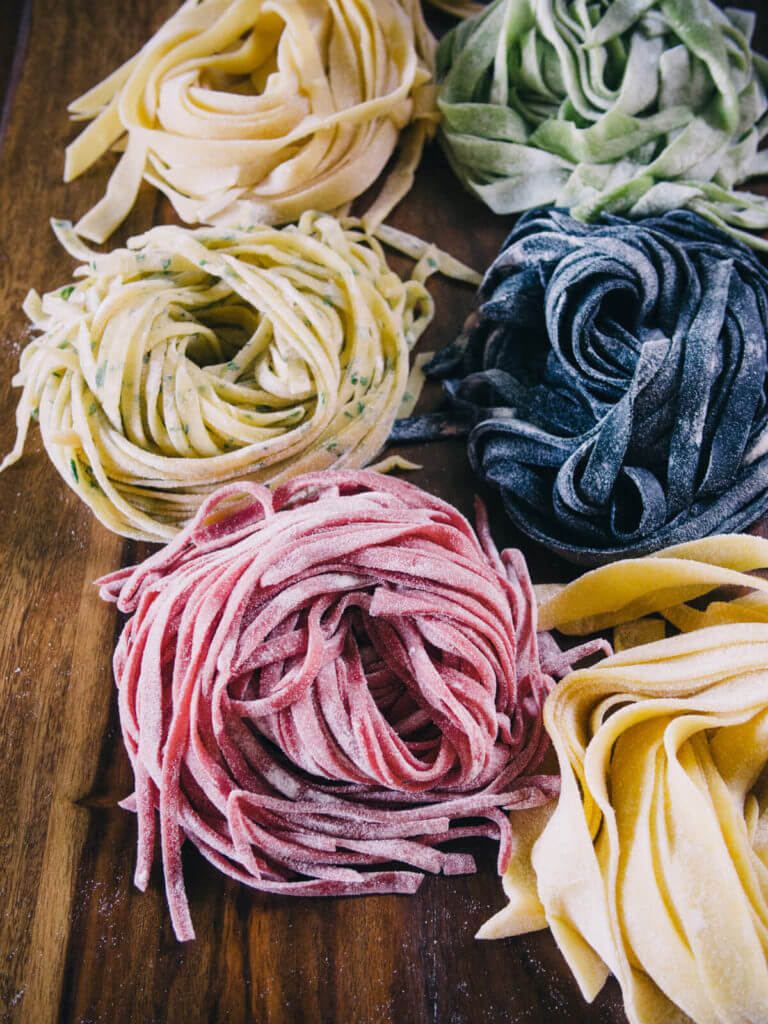
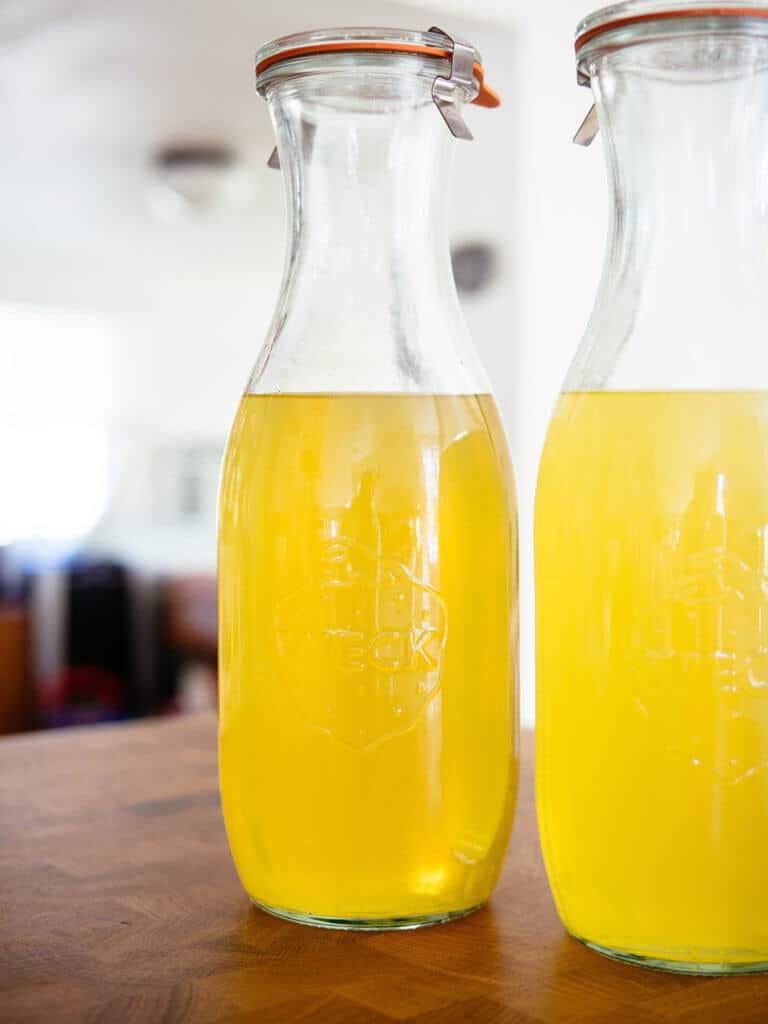

I’m doing research for my POTS (postural orthostatic tachycardia syndrome) community. You have no idea how excited I am about this recipe!! I’m gonna cry. I’m so happy I found this!!
Hi! I’m going to try this recipe for Ramadan this year! Just wondering if I can use sea salt instead of Kosher, as I don’t really have access to it!! Great recipe btw!
I came to this recipe bc I was unsure of the way my mom has been doing it HAHA
She made it her own way a few days ago and I told her about how it’s best to keep the jars in a cool area, not in the sun outside or by a window like she insists, so as not to encourage mold or bacteria growth. She says it’ll be alright and continues to leave it by the window in direct sunlight.
In that same conversation, she pulled out a jar that she made at least a year ago and left out in the sun. After scooping out the mold, she made herself a cup. I’m a first gen Asian American and I so I don’t know much about traditions or how many things are made, but this just feels very wrong to me. I wanted to ask for your advice. Her not knowing the difference would be fine, but she insisted on leaving it by the window which makes me feel like it’s supposed to be like that??
Hi, I made the preserve lemon but I pour salted water into the bottle warm instead of cool. Is that ok?
Yes that’s fine, no harm done.
What can I do with the brine after their time of pickling?
Hi there! I’m keen to give this a go but have never preserved lemons before. What size jars do you use and where do you get them from? Thank you
I use these wide-mouth jars: https://amzn.to/2zJBv2n
And I really like these plastic storage caps https://amzn.to/2MNW3zv which I use for jars that don’t need to be processed in a boiling water bath, as they won’t rust or dent, and can be reused over and over again.
5 Stars for this recipe!
About five weeks ago I followed your recipe except that I cut up the lemons a bit smaller & after 3 weeks, I used a small piece in my guacamole and the flavor is fantastic! A week later I used a piece (chopped up) in a homemade olive oil for salad dressing and it added really amazing flavor. I also added a piece to a cauliflower curry that I made… at the very end when it was served so the heat hopefully didn’t kill the good bacteria. YUM!!! The liquid is cloudy and the lemons have softened a lot so they mash up easily.
Thank you for this recipe! I’m making my 2nd batch so I can share it without regret (haha).
*Every day I checked for bubbles and used a sterilized chopstick wedged down the side & around the jar to allow the bubbles to rise to the surface.
What a great idea using it in guacamole! I’ll have to try that! So glad you’ve been enjoying this recipe. 🙂
Found your beautiful blog in Pinterest. Can’t wait to make this recipe. It’s one of my favorites!
Thank you Amy!
This is my second time making these, but the first recipe I followed was quite a bit different. In this case I got a whitish layer (presumably the yeast mentioned) totally covering the surface, but then that solid layer molded (gray blue) just on the very top of the solid layer of yeast. This is true for all four jars I preserved. I’ve removed this layer and the liquid and lemons and everything look fine, but I’m not sure whether or not to be concerned about the contents. It seems like the salinity of the solution would make it next to impossible to spoil, but I could be wrong…
If any part of the lemons rise above the brine and are exposed to air, they’re more likely to develop mold. You can weigh them down by placing a 4-ounce jelly jar on top of the lemons (the jelly jar should fit perfectly in a wide-mouth jar opening) to make sure they stay fully submerged. I use these: https://amzn.to/2tqC5hU
Oh wow the jelly jar idea is really good. Thank you. I’ve been trying to figure out something better than the toothpicks, pieces of chopsticks, skewers, etc., that I’ve tried.
As far as that mold was concerned it was just on top of the solid layer of yeast that had built up, and nothing else was near the surface. Once I pulled that yeast and mold layer off and then sealed the jars, there hasn’t been a single sign of it again. Have used about half of a jar of them too and they are definitely not dangerous. If the mold had been on the lemons themselves, I likely would have thrown them all out.
Hi, I made the salty lemon on May 3, 2017 and one of my jars has 2 white blobs floating on the top and all of my lemons are in the brine. Should I throw this jar out? Thanks in advance.
If all your lemons are submerged (and you’re sure they haven’t been in contact with air and you properly cleaned all your jars and utensils before using), then I’m unsure what the white blobs could be. They might be harmless kahm yeast or they might be the beginnings of mold. When it doubt, throw it out.
Yes all of my lemons are preserved and I cleaned my jars. The little blobs are only in one of my jars so I will throw it out, I have 3 more:) Thank you and I love your page, it has inspired me to start pickling and preserving.
I want to thank you for introducing me to the micro zester the heavens opened up and I heard angles sing. No more busting my hands up with the cheese grater:)
One of the most-used tools in my kitchen!! I love it for grating ginger and turmeric too.
Why salt the lemons if they are going to be submerged in brine anyway?
Salt helps draw out the juices.
Sure, but wouldn’t submerging it in brine, which is effectively salt water, have the same effect of drawing out the juices too?
Made your pickled lemons a month ago, tried the slated lemonade today and it’s delicious. Thanks!
You’re welcome!
Love your idea of adding preserved lemons to dressings too!
um, mine became gel at the bottom. I mean the lemons and brine are all there, just i went to pull out a slice and this lemony clear gel came with it. Is that ok or do I need to toss it?
It sounds normal. As long as there’s no black mold or rotten smell, your preserved lemon is fine to eat.
For my first jar, I forgot to make the brine.. is the brine an absolute necessity?
If your salted lemons aren’t submerged in a brine or their own juices, they can start to mold.
At what point if ever do you tightly close the lids?
I seal them normally after those 3 to 4 weeks of fermenting (though I usually open the jars once a month to check for spoilage, which can happen if the lemons float above the brine).
How cloudy does the water get. I made three jars and I’m not sure if they are right. Also if a lemon got dislodged and floated out oh the brine is that whole batch bad? Or if the brine level dropped even with the lemons??? Do you have a pick of the cloudiness for reference? Thank you.
The longer the lemons sit in the brine, the cloudier the brine will get. Mine started out slightly “foggy” as it’s pretty salty, but gradually turned darker and thicker, which is completely normal.
However, if you have lemons floating above the brine, that’s not good – those lemons will eventually mold on the surface where they have contact with air. Try to push them back down ASAP, as the brine is what’s preserving them. Another solution is to move your preserved lemons (with brine) into regular-mouth jars instead of wide-mouth jars, which help keep them down.
I just salted a jar each of lemons and limes. I am excited!
ขอบคุณค่ะน่ากินค่ะ หลายอย่างเลย มีมาส่งถึงที่นี่หรือเปล่าค่ะ ไปซื้ออะไรไม่ค่อยได้เลยค่ะ ปวดท้องอยู่เลย และขอบคุณค่ะที่เป็นห่วง ก็อยากไปเรียนทำบ้างนะค่ะ อาหารหลายๆอย่างด้วยค่ะ มีใครจะสอนแหววบ้างละค่ะ ขอบคุณค่ะ
This looks like the perfect cure for dehydration. Thank you! I’m off to preserve my lemon harvest. 🙂
thank you linda for showing me how to make this salty lemonn
Enjoy!
what wonderful ideas you have, and i am thinking of making some christmas gifts using some of these recipes! thank you so much for posting!
The longer that preserved lemons sit and age, the better they taste! I just opened a jar that I made last summer… yum!
This looks wonderful. I will definitely be giving this a try. I love all things lemon. Your photos are beautiful too. I’m really enjoying looking around your blog~Eileen
Thank you Eileen! In another couple weeks, I should have my limoncello recipe up too. It’s steeping as we speak. 🙂
Do you think it’s okay to use meyer lemons in this? They’re a cross between a lemon and an orange (maybe a mandarin orange), so I’m not sure if they’re as acidic as a regular lemon and if that has anything to do with the preservation.
Absolutely! The salt is what preserves the lemons, so feel free to use Meyer lemons (or any other citrus you have – it’s also a good way to preserve kumquats and oranges).
That looks very interesting- will have to give it a go.
Let me know how you like it!
Oooh, I love lemons and I love salt. I have to try this!